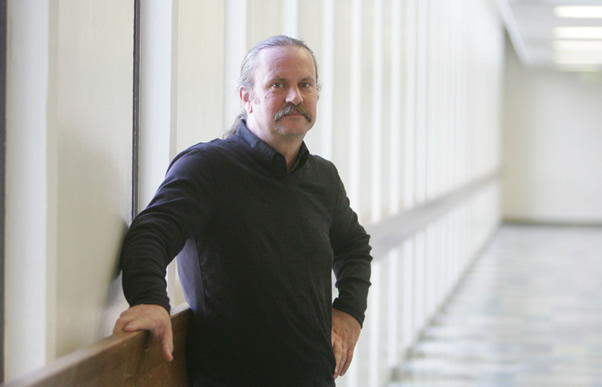Socrates Welcome in The OC
Cal State Fullerton Philosopher's Thoughts on the Classical Greek Philosopher, Virtues and Justice
May 4, 2010
By Mitch Avila
Two-and-a-half millennia after the Athenians — recognizing in Socrates a threat to their social order — tried and executed him, the spirit and values of the philosopher are alive and well in Orange County.
What changed in the intervening 2,500 years is not that philosophy is no longer disruptive, but rather, that the Socratic dimensions of philosophy have been harnessed by the state and civil society as a benevolent force for the collective good. This is perhaps best illustrated by Sidney Lumet’s classic 1957 film "12 Angry Men."
In the film, it is America itself that is on trial. The unanswered question of the American experiment is whether the demands of democratic self-rule can be met by a populace seemingly ill-equipped to handle those duties. The film demonstrates just how Americans can rise to these challenges: by turning to the very same Socratic values that were once a threat to the social order and establishing them as the very foundation of democracy and justice.
In a visually streamlined film like "12 Angry Men," the director’s decision to include uncharacteristically rich visual images demands our careful attention.
The visual sparseness of the film parallels its emphasis on the importance of Socratic dialogue and director Sidney Lumet departs from his standard visual motifs only at the beginning and end of the movie. In the opening shot, we see the façade of the Federal Court Building in lower Manhattan with its ornate columns. The camera pans up, revealing the building’s motto written on the frieze: “The true administration of justice is the firmest pillar of good government.”
Other columns appear at the close of the film. In a remarkable long shot at the close of the movie, the camera begins in the coat closet and pans up, around, and then down the jury table, revealing the detritus of deliberation process, until finally fading into a montage of the scene outside the Federal Court Building. As Henry Fonda’s character Davis walks out of the building, he is set against the backdrop of the pillars, a visual allusion to the pillars of the Parthenon in Athens and the building’s motto. The camera angle exaggerates Davis’s vertical stature representing him as a figurative pillar among actual pillars.
The visual imagery is unmistakable. Like Socrates before him, Davis and the virtues he represents are the “true application of justice” and the “firmest pillar of good government.”
The most important Socratic virtues all appear in "12 Angry Men." The importance of dialogue, the value of systematic questioning, the commitment to skepticism, the preference for truth over power and the assumption of egalitarianism. The philosophical foundations of good government are 2,500 years old.
And, the most important Socratic virtues still thrive in Orange County.
This year, the Philosophy Department at Cal State Fullerton celebrates 40 years of Socratic dialogue. One of Fullerton’s earliest traditions, the Annual Philosophy Symposium, now in its 40th year, also is one of its most successful and beloved.
Each year, the Philosophy Department invites leading philosophers from throughout the nation and the world for several days of conversation, dialogue, and yes, food and libation. Topics vary: art, religion, science, law, emotion, torture, and this year, race and embodiment. But, each year, the Socratic core of the Annual Philosophy Symposium remains the same: the dialogue, the systemic questioning, the pervasive skepticism, the relentless search for truth and the commitment to egalitarian inquiry.
These commitments are evident in one of the annual symposium’s most important features: the opportunity for undergraduate students to respond to leading philosophers. After each invited speaker presents, student respondents are given an opportunity to present prepared comments. And there it is: the spirit of Socrates embodied in an undergraduate who, pursuing truth, harnesses the power of skeptical inquiry to frame a dialogue with his or her peer. This is the fundamental lesson the symposium teaches us each year: when you use reason, everyone is your peer.
Of course, we make no claim to be the sole source of Socratic virtue at Cal State Fullerton. The commitments to reason, dialogue and egalitarianism are hallmarks of faculty and departments throughout the university, in every discipline and every corner of the academy. So many of Symposia have been interdisciplinary for just this reason: we recognize in our colleagues the same basic commitments and values. As philosophers, we may cherish our special relationship to the flame of reason, but that flame burns bright throughout our university wherever students and faculty work together to replace ignorance and dogma with reason and truth.
In the end, the importance of the Annual Philosophy Symposium is not just about providing opportunities for undergraduates or about boosting the reputation of the department or even about Cal State Fullerton. It’s about our region, about Orange County. It’s about making certain that the “the firmest pillar of good government” stands strong for generations to come.
Socrates, welcome to the OC.
Mitch Avila is chair and associate professor of philosophy.


